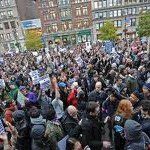My youngest daughter is sick with cold (say it together now: awwwwwwww), and thus we did not send her to her Islamic school today. My older daughter, however, is off today for the Martin Luther King holiday, because she attends public school. The discrepancy irks me deeply.
Me? No such luck. No day off today. My banker did, as did my letter carrier. I, however, did not. In fact, I don’t think I remember clearly when the last time I had his birthday off. We in the medical field do not take it off, except, of course, if you work in a county hospital.
Yet, like said before, the fact that my daughter’s Islamic school does not take MLK day off bothers me. All Islamic schools, except perhaps those established by African-American Muslims, have been built by Muslims who have immigrated to this country from abroad. They, even more than many African-Americans themselves, have benefited from the struggles of the civil rights movement. But for brave Americans like Dr. Martin Luther King, Rev. Jessie Jackson, Rosa Parks, and countless others, immigrant Muslims would not have been able to come to this country, establish themselves economically, live in peace and security, and build those mosques and Islamic schools.
But for the brave Americans who faced the stinging spray of the fire hose, the ferocious bite of the police dog, and the blunt brutality of the officer’s baton, American Muslims would not have advanced to the place in society in which they are today. The same goes with me. But for those brave Americans (and the Grace of God), I would not been able to grow up in the Northwest suburbs of Chicago, a predominantly white and affluent area. I would not have been able to go to the elementary and secondary schools I attended. I would not have been able to attend Marquette University, a predominantly white and Catholic institution. I would not have been able to attend medical school. For everything that I am, after the Precious Lord, I have them to thank: those brave Americans who said “Enough!” and stood up for their rights.
They stood up – endangering their lives in the process – and asked America to cash the “promissory note to which every American was to fall heir… a promise that all men, yes, black men as well as white men, would be guaranteed the unalienable rights of life, liberty, and the pursuit of happiness,” in the eloquent words of Dr. Martin Luther King, Jr.
The discrimination that American Muslims have suffered in the aftermath of the attacks of September 11 is indeed shameful. The attacks on American mosques is indeed hurtful and horrible. The increased scrutiny to which American Muslims are now subject is indeed most unwelcome. Yet, they are not new. Legions before us have suffered as we have suffered. Nay, they have suffered worse. They have been murdered for allegedly whistling at a white woman. They have been attacked, lynched, raped, and pillaged for no other reason than their skin is brown and black.
Their houses of worship – Christian churches, not Muslim mosques – have been, not only attacked, but burned to the ground, sometimes with worshippers still inside. I have never had to sit at the back of a bus because of the color of my skin. I have never had to drink from a different water fountain because I was not white. I did not have to attend a “separate, but equal” school. I have never had to eat at a restaurant whose sign read “Coloreds Only.” I have never had to pay a tax or take a test so I can exercise my constitutional right to vote. They did, however, and they struggled to end this injustice. We eat of the fruits of their struggle each and every day.
We, as American Muslims, have to acknowledge this. We, as American Muslims, would not be worthy of being called Servants of God if we did not acknowledge this. And we must be grateful. This does not mean we should thank every African-American we see on the street. No. Our gratitude must be manifested in our actions. Yes, we must stand up and defend the rights of American Muslims who have been wronged. But, as Senator Barack Obama said, “If there’s a child on the south side of Chicago who can’t read, that matters to [us], even if it’s not [our] child. If there’s a senior citizen somewhere who can’t pay for her prescription and has to choose between medicine and the rent, that makes [our lives] poorer, even if it’s not [our] grandmother.” An injustice committed anywhere in America must be an affront to American Muslims everywhere.
I hope and pray that my local Islamic school is in the minority, and other Islamic schools have taken the day off and, more importantly, told their students why they have taken the day off. Yet, a day without class is not the only way to commemorate this very important occasion. Many schools do not take the day off, but rather spend the day, or a substantial part of the day, talking about Dr. King, his legacy, and the civil rights movement. It is my hope and prayer that more Islamic schools do the same. It would send a very powerful message: American Muslims are not heedless of the enormous sacrifice of Dr. King and his contemporaries for equality and justice. More importantly, however, it is my hope and prayer that more Islamic schools study Dr. King and the civil rights movement and learn its many, many important lessons; for the good of the American Muslim community, and the good of the country.
Hesham A. Hassaballa is a Chicago physician and writer. He is the co-author of “The Beliefnet Guide to Islam,” published by Doubleday in 2006. His blog is at godfaithpen.com. This article was originally published at altmuslim.com in 2006.












